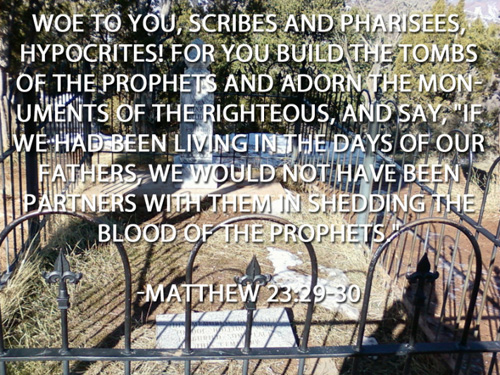History is in the eye of the beholder, and we can never say what we would do if we suddenly found ourselves generations past. If we were in the time of Columbus, would we think that the earth was round or flat?
If we looked into Copernicus's telescope and considered his model for the sun-centered galaxy, with whom would we side? Those who sought to destroy him, or the people that believed he was right? The Pharisees find themselves speaking too fast to the God who knows all in the final woe that Jesus delivers in Matthew 23:29-32:
Woe to you, scribes and Pharisees, hypocrites! For you build the tombs of the prophets and adorn the monuments of the righteous, and say, "If we had been living in the days of our fathers, we would not have been partners with them in shedding the blood of the prophets." So you testify against yourselves, that you are sons of those who murdered the prophets. Fill up, then, the measure of the guilt of your fathers.
The specific hypocrisy that Jesus is coming against is that the scribes and Pharisees were externally giving honor to the old prophets yet planning the murder of Jesus, the One whom the prophets spoke about! Many famous people who greatly contributed to our world have died without honor only to have tombs, memorials, or monuments built for them later. Though many exist, I stumbled on one in my geocaching days as I took a week off driving aimlessly in search of geocaches in Colorado. I came to the glorious little town of Glenwood Springs and learned of a hike to a cemetery at the top of the mountain, so I made the hike. At the top, I found a memorial built to the famous western gambler and gunslinger, John 'Doc' Holliday. Though famous even in his day, he died in poverty in a hotel due to complications of tuberculosis and was buried in an unmarked grave at the top of the mountain. The monument was only erected later in honor of his life. The Pharisees did the same thing with the prophets. We read in Hebrews 11 what happened to many of the prophets:
Others were tortured, not accepting their release, so that they might obtain a better resurrection; and others experienced mockings and scourgings, yes, also chains and imprisonment. They were stoned, they were sawn in two, they were tempted, they were put to death with the sword; they went about in sheepskins, in goatskins, being destitute, afflicted, ill-treated (men of whom the world was not worthy), wandering in deserts and mountains and caves and holes in the ground (Hebrews 11:35-38).
Like the two witnesses, the prophets were not well celebrated in life, but generally, only in their death. Here, the Pharisees say that they would not have taken part in how the prophets were treated. They believed themselves to be so righteous that they could see the prophecies unfold before them, yet simultaneously they were plotting the death of Jesus. This is a most horrible woe that serves as a reminder to us that hindsight is always 20/20, and we must be humble in our walk with God and seek His word in the Scriptures so that we do not forget who Christ is and what He came to do.
The Modern Day

As we look at this woe in the context of the modern Christians, I think that it is important to make a distinction that we should not argue from the position of tradition for traditions sake, after all, that is what the Pharisees do. But we do not want to swing the other way and totally reinvent the church or Christian traditions, either. Ultimately, rather than blindly follow the old way or throw out everything that our faith was built on, each generation should seek the scriptures and follow them obediently. This means that we walk the tightrope between legalism and antinomianism, sort of like what Jesus said about entering heaven:
Enter through the narrow gate; for the gate is wide and the way is broad that leads to destruction, and there are many who enter through it. For the gate is small and the way is narrow that leads to life, and there are few who find it (Matthew 7:13-14).
Let us not forget about the faithful servants who brought us the Gospel and the faith. This goes far beyond just the Apostles, but we should also consider church fathers like Origin and Augustine, we should consider the councils that clarified key points of faith and the authors that bring us God-honoring books. Most importantly, we should not turn aside from those authors that call us to obedience, because whether we like it or not, the message of Jesus and the Apostles is about living right before God, both through the sacrifice of Jesus and through our intentional sanctification. If you want to learn more about how to be sanctified, check out my book Testing and Temptations.
